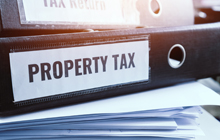When an accountant’s client is paying too much property tax

The next step may be an appeal … or no step at all
OTTAWA – As I wrote in part one of this series on accounting firms, their clients and municipal property tax in Canada, if a property owner is paying more than their fair share of property tax, they are actually subsidizing their neighbours and their competition.
That may lead you to the reasonable conclusion that if you find a potential problem, it would only make sense to take formal action. Sometimes it does, sometimes it doesn’t. It depends on two things:
- The dollar amount of the discrepancy — what is the financial threshold that makes such an effort worthwhile?
- The cost and complexity involved with mounting that effort for a correction.
 |
John Clark, vice-president, tax and valuation, Regional Group. |
The second point will obviously impact the first. That measure of “cost and complexity” is itself complex because it will vary depending on which province or territory the property in question is located. A property’s assessed value (along with what type of use for which it is classified) is the basis on which the local municipality will determine its fair share of property tax.
If the property owner or their representative finds fault with the assessment, there are generally two stages of recourse. In Ontario, for example, the first is a Request for Reconsideration (RfR). This, as the name suggests, is a request to have an assessor take a second look, at no cost.
If this still doesn’t suffice, the next step would be to mount a formal appeal, which is much more involved. In Ontario, an appeal is a fee-based process before the Assessment Review Board — an independent adjudicative tribunal administered by the province’s Ministry of the Attorney General.
In the case of an Ontario RfR, your client can afford to quibble over nickels and dimes. For a full appeal in Ontario, where the process moves at a glacial pace, can require legal representation and the involvement of other third-party consultants, logic would dictate more serious dollars must be at stake.
At the other end of the spectrum from Ontario is Saskatchewan, which has a system for property assessment that is extraordinarily client-focused. (I will share an anecdote that illustrates this in my next post).
So, what is that financial threshold?
Generally speaking, mounting a formal appeal is likely not worth the time and expense (especially when a lawyer or paralegal must be retained) unless the property tax bill in question is at least $20,000 a year. Any less and any consultant retained to assist had better work in a very efficient manner. Even if the margin of error on the disputed assessment is as much as 25 per cent, that only amounts to a potential refund/adjustment of $5,000 on a $20,000 tax bill — a gain which can disappear quickly with the costs of the appeal.
There are, of course, caveats to this. If your appeal is for a number of years and if it can be proven that the property has been unfairly assessed for these years, the owner could stand to receive a retroactive repayment far greater than that $5,000. The likelihood of this error carrying forward into future assessment cycles if it is not addressed — and the resulting cost — must also be considered.
What can Canadian accountants do to help?
As a chartered professional accountant, you can provide added value to your client and facilitate the process in several ways. First, if your accounting firm has a number of clients with revenue-generating properties, consider creating a matrix or database that tracks which client is up and which is down — this trendsetting and benchmarking may make it easier to flag outliers that may warrant a closer look.
CPAs have the professional experience either to work with the assessor directly or with an appraiser who can assist in evaluating their clients’ properties. If there is reason to suspect a valuation issue, the accountant can work with an appraiser they know to confirm if there is a case to made, to build that case and to determine a resolution.
In my next post in this series, I’m going to give you my thoughts on the assessments and appeals process across Canada, broken down into provinces and territories. As an expert in this field with decades of experience, I’ve seen key differences in provincial approaches to assessments, and I’m looking forward to sharing my opinions with you.
John Clark is vice-president, tax and valuation, at Regional Group, which is based in Ottawa. Read his first post, “Why accountants should question property tax assessments,” online at Canadian Accountant.











(0) Comments